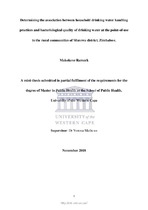| dc.contributor.advisor | Mathews, Verona | |
| dc.contributor.author | Rameck, Makokove | |
| dc.date.accessioned | 2019-06-07T10:47:32Z | |
| dc.date.available | 2019-06-07T10:47:32Z | |
| dc.date.issued | 2018 | |
| dc.identifier.uri | http://hdl.handle.net/11394/6859 | |
| dc.description | Magister Public Health - MPH | en_US |
| dc.description.abstract | There is growing awareness that drinking water can become contaminated following its collection from safe communal sources such as boreholes, as well as during transportation and storage in the house. Drinking water is the most important source of gastroentric diseases worldwide, mainly due to post collection contamination of drinking water. Globally, waterborne diseases are a major public health problem, causing millions of deaths annually.
Aim: To determine the association between household drinking water handling practices and bacteriological quality of drinking water at the point-of-use in the rural communities of Murewa district in Zimbabwe. | en_US |
| dc.language.iso | en | en_US |
| dc.publisher | University of the Western Cape | en_US |
| dc.subject | Coliforms | en_US |
| dc.subject | Quality of water | en_US |
| dc.subject | Zimbabwe | en_US |
| dc.subject | Escherichia coli | en_US |
| dc.subject | Communal water sources | en_US |
| dc.title | Determining the association between household drinking water handling practices and bacteriological quality of drinking water at the point-of-use in the rural communities of Murewa district, Zimbabwe | en_US |
| dc.rights.holder | University of the Western Cape | en_US |

